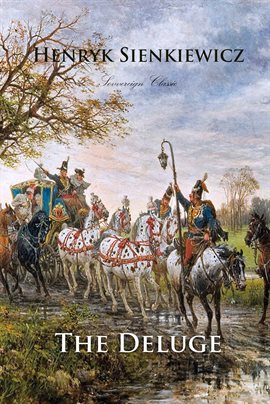 The Deluge by Henryk Sienkiewicz, translated by WS Kuniczak, 1761 pages (2 vols.)
The Deluge by Henryk Sienkiewicz, translated by WS Kuniczak, 1761 pages (2 vols.)
In the 17th century, the Polish-Lithuanian Commonwealth, already staggered by attacks from the Russians and the Cossacks in the east, was buried under the weight of the disciplined armies of Sweden which invaded from the north. This dark time in Polish history is known as the Deluge. It was a time when many who might have been expected to lead the nation instead betrayed her, but also a time when heroes arose from unlikely places and circumstances. Sienkiewicz's epic novel centers on one of the latter, the passionate, impetuous, spirited young officer Andrei Kmita, who finds himself unexpectedly betrothed to the beautiful, virtuous Olenka and becomes locked in a battle with himself to become worthy of her. Their world is populated by memorable characters: the valiant, diminutive Volodyovski, the silver-tongued braggart Zagloba, the fractious Kemlitches, the devious Radzivill, and the diabolical Prince Boguslav.
The Deluge is an unqualified masterpiece. It is natural to compare it to Tolstoy and Undset, but it can just as accurately be placed alongside Homer, Virgil, and the Romance of the Three Kingdoms. The "modern translation" by WS Kuniczak was released in 1991, after the end of another, even longer and darker chapter in the history of Poland. In that context, it should be even clearer that what was fought for was something much greater than the "rights and privileges" of the nobility, greater too than what Thomas Napierkowski, in his introduction to this edition, celebrates as "political pluralism... democratic institutions and... a free economy", something glimpsed at the turning point when Andrei, expiating his sins by risking his life in defence of the great Marian shrine of Jasna Gora, declares himself "a soldier of the Holy Mother, fighting Her battles."
No comments:
Post a Comment